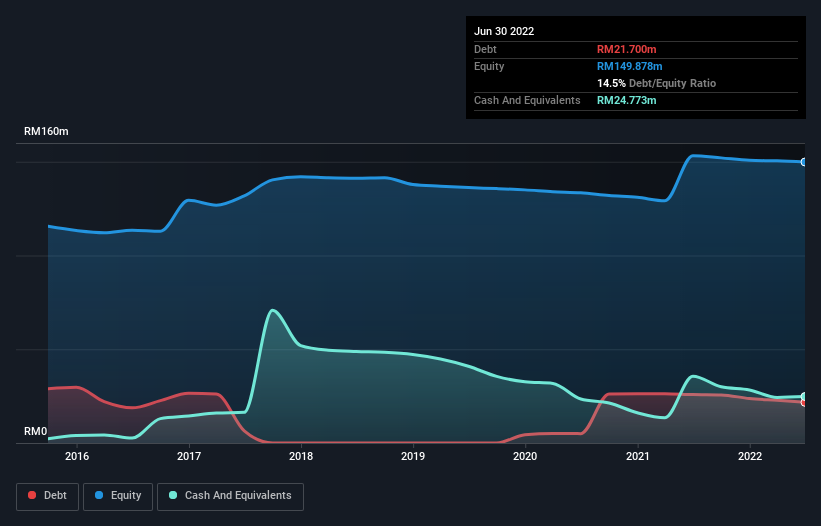- Malaysia
- /
- Real Estate
- /
- KLSE:PARKWD
Parkwood Holdings Berhad (KLSE:PARKWD) Has Debt But No Earnings; Should You Worry?

Howard Marks put it nicely when he said that, rather than worrying about share price volatility, 'The possibility of permanent loss is the risk I worry about... and every practical investor I know worries about.' So it might be obvious that you need to consider debt, when you think about how risky any given stock is, because too much debt can sink a company. As with many other companies Parkwood Holdings Berhad (KLSE:PARKWD) makes use of debt. But the more important question is: how much risk is that debt creating?
Why Does Debt Bring Risk?
Debt is a tool to help businesses grow, but if a business is incapable of paying off its lenders, then it exists at their mercy. Ultimately, if the company can't fulfill its legal obligations to repay debt, shareholders could walk away with nothing. While that is not too common, we often do see indebted companies permanently diluting shareholders because lenders force them to raise capital at a distressed price. Of course, the upside of debt is that it often represents cheap capital, especially when it replaces dilution in a company with the ability to reinvest at high rates of return. When we think about a company's use of debt, we first look at cash and debt together.
Check out our latest analysis for Parkwood Holdings Berhad
What Is Parkwood Holdings Berhad's Net Debt?
As you can see below, Parkwood Holdings Berhad had RM21.7m of debt at June 2022, down from RM25.8m a year prior. However, it does have RM24.8m in cash offsetting this, leading to net cash of RM3.07m.

How Strong Is Parkwood Holdings Berhad's Balance Sheet?
We can see from the most recent balance sheet that Parkwood Holdings Berhad had liabilities of RM4.83m falling due within a year, and liabilities of RM22.6m due beyond that. Offsetting this, it had RM24.8m in cash and RM3.44m in receivables that were due within 12 months. So it actually has RM798.6k more liquid assets than total liabilities.
This state of affairs indicates that Parkwood Holdings Berhad's balance sheet looks quite solid, as its total liabilities are just about equal to its liquid assets. So while it's hard to imagine that the RM49.5m company is struggling for cash, we still think it's worth monitoring its balance sheet. Simply put, the fact that Parkwood Holdings Berhad has more cash than debt is arguably a good indication that it can manage its debt safely. When analysing debt levels, the balance sheet is the obvious place to start. But it is Parkwood Holdings Berhad's earnings that will influence how the balance sheet holds up in the future. So if you're keen to discover more about its earnings, it might be worth checking out this graph of its long term earnings trend.
In the last year Parkwood Holdings Berhad wasn't profitable at an EBIT level, but managed to grow its revenue by 16%, to RM12m. That rate of growth is a bit slow for our taste, but it takes all types to make a world.
So How Risky Is Parkwood Holdings Berhad?
Statistically speaking companies that lose money are riskier than those that make money. And the fact is that over the last twelve months Parkwood Holdings Berhad lost money at the earnings before interest and tax (EBIT) line. Indeed, in that time it burnt through RM2.5m of cash and made a loss of RM3.4m. However, it has net cash of RM3.07m, so it has a bit of time before it will need more capital. Even though its balance sheet seems sufficiently liquid, debt always makes us a little nervous if a company doesn't produce free cash flow regularly. There's no doubt that we learn most about debt from the balance sheet. But ultimately, every company can contain risks that exist outside of the balance sheet. We've identified 3 warning signs with Parkwood Holdings Berhad (at least 1 which is a bit unpleasant) , and understanding them should be part of your investment process.
At the end of the day, it's often better to focus on companies that are free from net debt. You can access our special list of such companies (all with a track record of profit growth). It's free.
New: Manage All Your Stock Portfolios in One Place
We've created the ultimate portfolio companion for stock investors, and it's free.
• Connect an unlimited number of Portfolios and see your total in one currency
• Be alerted to new Warning Signs or Risks via email or mobile
• Track the Fair Value of your stocks
Have feedback on this article? Concerned about the content? Get in touch with us directly. Alternatively, email editorial-team (at) simplywallst.com.
This article by Simply Wall St is general in nature. We provide commentary based on historical data and analyst forecasts only using an unbiased methodology and our articles are not intended to be financial advice. It does not constitute a recommendation to buy or sell any stock, and does not take account of your objectives, or your financial situation. We aim to bring you long-term focused analysis driven by fundamental data. Note that our analysis may not factor in the latest price-sensitive company announcements or qualitative material. Simply Wall St has no position in any stocks mentioned.
About KLSE:PARKWD
Parkwood Holdings Berhad
Engages in the development and management of properties in Malaysia.
Excellent balance sheet low.
Market Insights
Community Narratives




